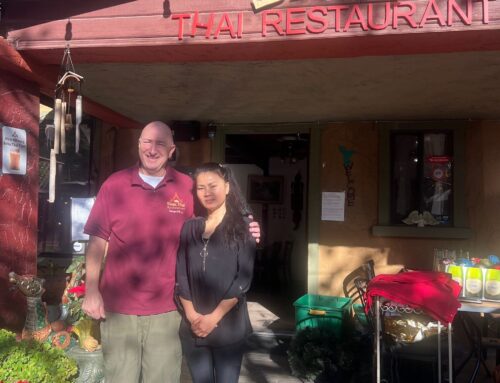ABAR founded in 2017 by Morgan Hill couple
![]()
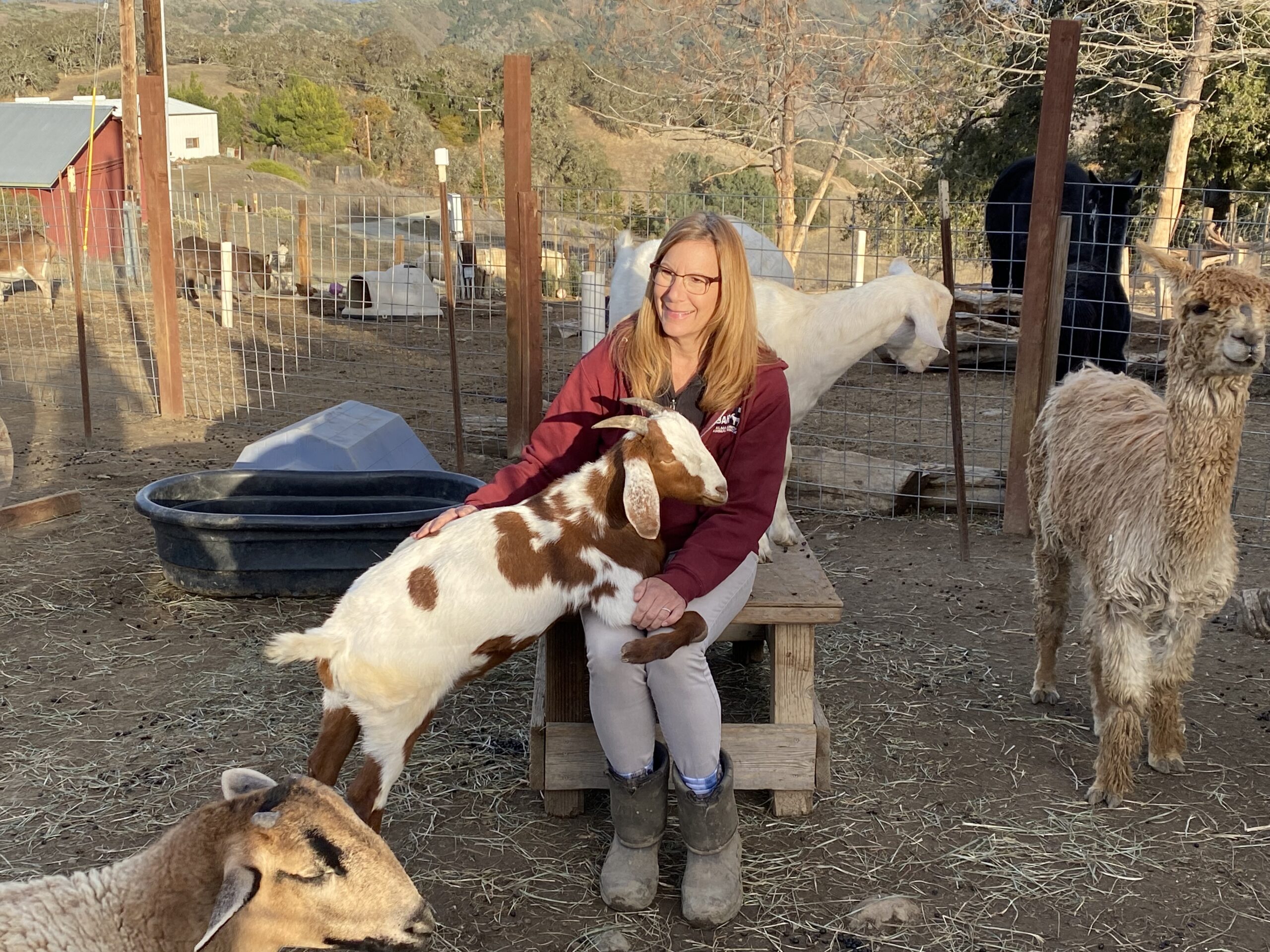
Murphy, who along with her husband, Michael, founded Alma Bonita Animal Rescue, with some of her rescued farm animals. Photo by Nolan Lyle Sheila
By Nolan Lyle

Nolan Lyle
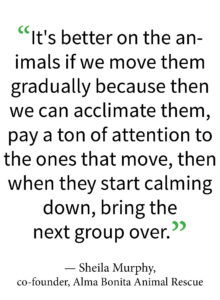 For five years, the Alma Bonita Animal Rescue nonprofit has sat on 40 acres in the mountains west of Morgan Hill, serving a mission to help unwanted, old, and injured farm animals.
For five years, the Alma Bonita Animal Rescue nonprofit has sat on 40 acres in the mountains west of Morgan Hill, serving a mission to help unwanted, old, and injured farm animals.
During the past few weeks, its organizers and volunteers have been moving the location to a nearby new property.
Alma Bonita means “beautiful soul” in Portuguese. People who visit the site find the friendly farm animals often come up to them at the fence and their eyes show they indeed have beautiful souls. They become buddies with the strutting mini-horses, the loud braying donkeys, the curious goats, the big horses, the quacking ducks, the barking dogs, the prowling cat, the cool-haired alpaca, the clucking chickens, and Norman the gentle, giant cow who reminds visitors of “Ferdinand” from the story book. The pigs often are sleeping.
By the end of the year, ABAR’s animals will be changing their home to a 15-acre location of more usable land down in a valley less than two miles away. There’s more flat land there, and the animals tend to stay close so the smaller property will be used more efficiently.
“We’re probably only utilizing about 10 acres if I had to guess,” said Sheila Murphy, who founded the rescue farm with her husband, Michael, in 2017. “All the animals are concentrated up here at the shelters, and this is only a couple acres.”
Moving is a difficult challenge for the Murphys to do alone. Volunteers assist by building new pens and other repair and renovation projects before transporting animals to their new home.
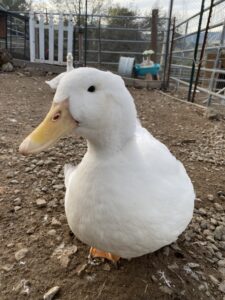
Photo by Nolan Lyle
“We’re building fences, doing irrigation for the water out to the barn, we’re looking for an electrician for the electricity, and moving the corrals — all that’s going to be happening,” Murphy said. “All these things are already existing, but they’ve been there so long, we need to make sure they’re all safe.”
Moving the animals themselves is also a difficult endeavor. It takes them a while to get used to the new home and some didn’t have a good start, she said.
“It’s a little chess strategy and it’s a lot less pressure,” she said. “It’s better on the animals if we move them gradually because then we can acclimate them, pay a ton of attention to the ones that move, then when they start calming down, bring the next group over.”
The nonprofit’s organizers plan to finish moving the animals over three moves. They hope to be finished by the end of December.
ABAR is always in need of assistance. Its volunteers come and help in the morning when they let all the animals out of their pens. They need volunteers to help put them away in the evening, too. They put all the animals back in their enclosures at night so they don’t get attacked by mountain lions or other predators. They need help cleaning and feeding, too. Helping feed all of the animals is a challenge. On weekends having people assist when they do deep cleaning is something ABAR can especially use help with.
People who can’t volunteer can donate funds or purchase items ABAR needs from their Amazon wish list. (www.amazon.com/hz/wishlist/ls/2S37U3XRN38BE?ref_=wl_share) ABAR also holds a fundraiser. Their inaugural golf tournament was held at Bay View Golf Club in Milpitas. They hope to bring the 2023 one to the South Valley.
“We’re planning to do it closer to Morgan Hill next year,” Murphy said. “We had 40-plus golfers, which was a great turnout for our first tournament.”
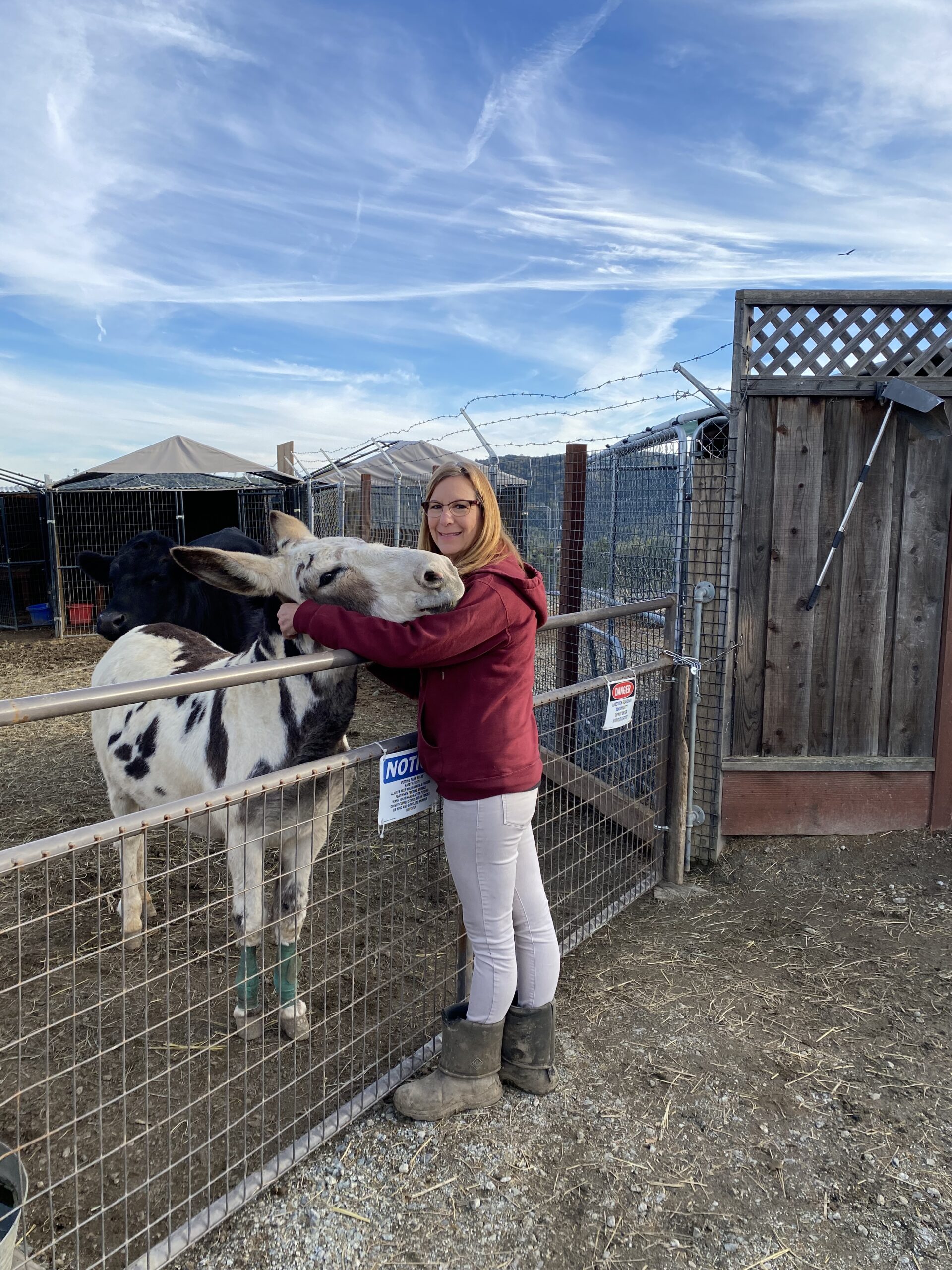 After ABAR moves into its new location, they plan to hold an open house for the public to discover what they do. Murphy would like to have a special aspect to her nonprofit that involves families.
After ABAR moves into its new location, they plan to hold an open house for the public to discover what they do. Murphy would like to have a special aspect to her nonprofit that involves families.
“We’re going to need to put up a lot of six-by-six fence posts,” she said. “Once they’re in, I want to do a family activity where you would donate a set amount (of money), and your family gets to paint a fence post. So anytime you come visit you can see your family’s own artwork post at ABAR.”
This is a win-win because it will help pay for the posts while families get a special connection to the rescue organization, she said.
ABAR does not charge an entrance fee to visit their farm animals. However, they recommend a $50 donation per family.
“The reason we did it that way is we never wanted to turn anyone away for not being able to pay,” Murphy said. “I was in education (as a career), and I remember families that didn’t have certain experiences because they couldn’t afford it.”
ABAR is happy to be open to anyone who desires to see the animals. They’re all about being inclusive. Murphy’s goal is to let people spend time with and get an up close experience with the farmyard friends. No one should be denied because they can’t pay.
“I’ve had people give me eight crumpled dollars, and that’s the best they can do. And, I have groups that leave and hand me $500,” she said. “I always felt like it balanced itself out in the end. That has always been really deep in our philosophy.”
Murphy’s vision is that people leave the rescued critters with an understanding about compassion, empathy, and resilience. These animals have gone through so much, and they still have learned to forgive. Everybody can heal with some time, compassion and empathy.
“We had a horse that used to get beaten and she wouldn’t go near a human. And now she’s our most affectionate horse,” Murphy said. “A lot of humans go through trauma in their life and then they never want to forgive or have empathy for others. These animals, they teach us that forgiveness is essential for quality of life.”
Animals serve as good role models to teach how we can be better humans. ABAR has a goat named Rocky, whose front legs are a little bent and don’t work too well, which makes him different. He wags his tail, he smiles, he plays with the other goats and he just gets on. Just because he’s a little bit different doesn’t mean he can’t fit in with the rest of the goats.
 “The empathy that they’ve taught me is priceless. The resilience, just watching what they’ve been through and how they’ve come out the other side,” Murphy said. “Some of us humans would just feel sorry for ourselves. Animals don’t have that feeling. It’s almost a spiritual quality.”
“The empathy that they’ve taught me is priceless. The resilience, just watching what they’ve been through and how they’ve come out the other side,” Murphy said. “Some of us humans would just feel sorry for ourselves. Animals don’t have that feeling. It’s almost a spiritual quality.”
These animals have a compassion that humans can learn from. Being in the presence of the animals can bring someone calm, quiet and peace, so many people visit the ABAR farm animals for therapy, she said.
“We have had quite a few mental health groups come up and do tours, but we’ve also had people dealing with mental health issues just ask to come and spend time with the animals,” Murphy said. “We absolutely love that. You can just come and sit and be, and it is like this spiritual kind of re-grounding that happens if you just sit quietly with the animals.”
Nolan Lyle is an eighth grader at Charter School of Morgan Hill. He wrote this story with assistance from Morgan Hill Life Publisher Marty Cheek.







